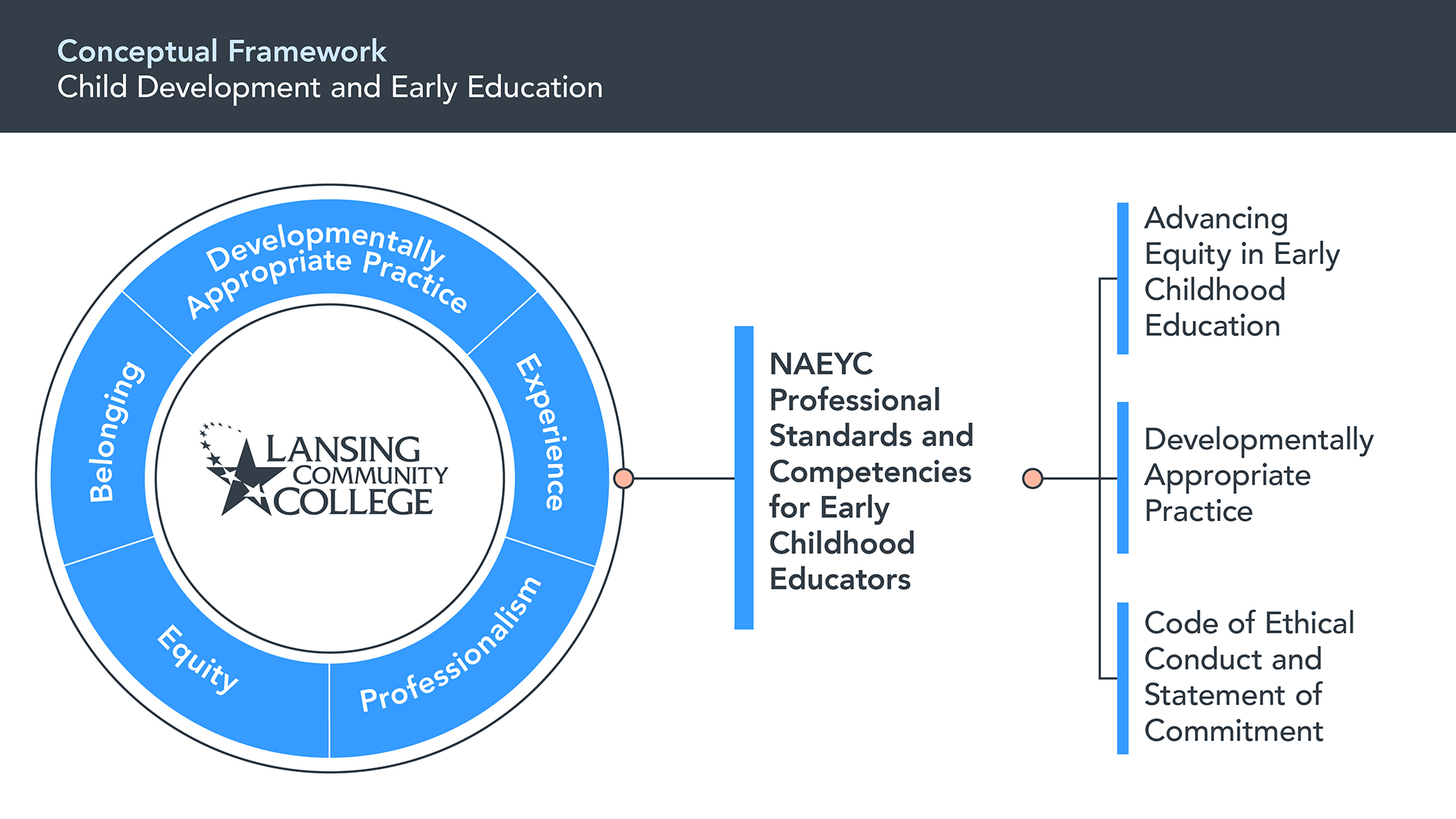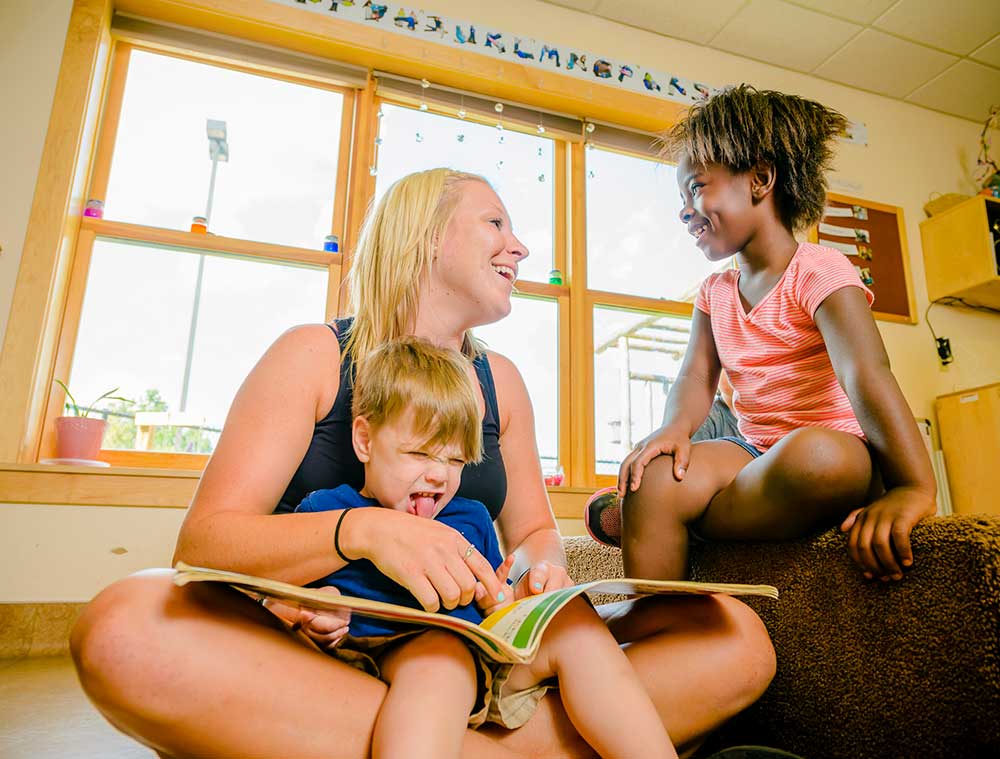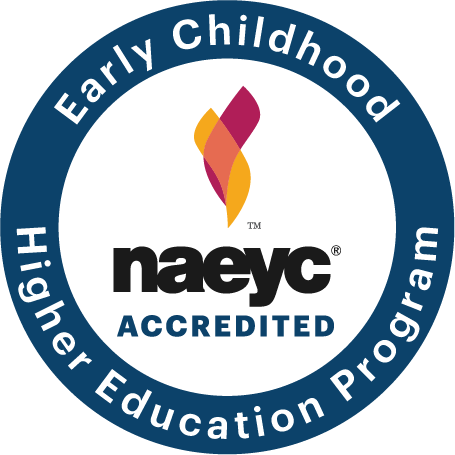Overview
Lansing Community College offers two program options in Child Development and Early Education. Each addresses the various components of high quality early childhood education in a variety of settings and for all ages, including infants, toddlers, preschoolers, and school-aged children. Instructional methods include lecture-discussion, hands-on experiences, and supervised fieldwork. Some courses are offered on-line or as a hybrid.
Conceptual Framework
Introduction
The Conceptual Framework of the Child Development and Early Education at Lansing Community College is a living document that:
- Identifies the program's mission and core values
- Guides the program’s purpose and governing principles
- Highlights the program’s unique characteristics within the context of our community
- Directs faculty in decision making
- Serves as a foundation for the development, implementation, evaluation, and revision of courses and curriculum
- Provides inspiration to students, faculty, and the community
The Conceptual Framework is aligned with the National Association for the Education of Young Children (NAEYC) Professional Standards and Competencies for Early Childhood Educators. In creating the Conceptual Framework, the Child Development and Early Education faculty referenced the following NAEYC Position Statements:
- Developmentally Appropriate Practice in Early Childhood Programs, Fourth Edition
- Advancing Equity in Early Childhood Education
- Code of Ethical Conduct and Statement of Commitment
The Child Development and Early Education Associate in Applied Arts Degree at Lansing Community College is accredited by the Commission on the Accreditation of Early Childhood Higher Education Programs of the National Association for the Education of Young Children. The accreditation term runs from 03/2018 to 03/2025.
Mission Statements
Lansing Community College Mission
Lansing Community College provides high-quality education ensuring that all students successfully complete their educational goals while developing life skills necessary for them to enrich and support themselves, their families, and their community as engaged global citizens.
Child Development and Early Education Mission
The Child Development and Early Education program prepares students for work in the field of early childhood education through curriculum and programming that reflect the following core values:
- Belonging
- Developmentally Appropriate Practice
- Equity
- Experience
- Professionalism
Conceptual Framework Image

Child Development and Early Education Core Values
Belonging
Students and Faculty will:
- Build responsive, reciprocal, and respectful relationships
- Create respectful and inclusive learning environments
- Recognize the funds of knowledge of children, families, students, faculty, and communities
- Apply a strength-based approach that supports inclusion
- Collaborate and engage with families, colleagues, and the community to support learning and development
Developmentally Appropriate Practice
Students and Faculty will:
- Use the Three Core Considerations of DAP to make evidence-based decisions
- Commonality: Understand the developmental period of early childhood from birth through age 8
- Individuality: Recognize and value the unique characteristics of each individual
- Context: Understand that development and learning occur in multiple contexts
- Champion children’s learning through play
- Incorporate Universal Design for Learning (UDL)
- Use intentional teaching practice to create learning environments
- Adopt a holistic view of development and learning
- Create environments for optimal development and learning
Equity
Students and Faculty will:
- Participate in ongoing professional learning and reflection to examine their own values, beliefs, and biases
- Recognize the power and benefits of diversity and inclusivity
- Use culturally and linguistically relevant anti-bias teaching strategies
- Model respect for equity, diversity, and inclusivity
- Challenge bias, microaggressions, structural inequities, and oppression
Experience
Students and Faculty will:
- Engage in observation and field experience in a variety of early childhood settings and with a variety of age groups
- Connect classroom teaching and learning with practical application
- Participate in open-ended learning, discovery, and play
- Reflect on teaching practice through coaching and mentoring
Professionalism
Students and Faculty will:
- Engage in continuous, collaborative life-long learning to inform practice
- Practice intentional reflection, assessment, and goal-setting
- Know about and uphold ethical and other early childhood professional guidelines
- Advocate for the profession, students, children, and families
- Use effective, respectful, and responsive communication strategies
- Identify as a professional member of the early childhood field
History and Evolution
2007-2008: The first version of the Child Development and Early Education conceptual framework was drafted through collaboration of full-time and part time faculty, field instructors, and community stakeholders.
2016: A visual graphic and video highlighting the conceptual framework was created to increase awareness, understanding, and visibility.
2022: Full time and part time faculty, field instructors, students, and community stakeholders reviewed the conceptual framework, and updated it to better represent the Child Development and Early Education program and reflect the NAEYC Professional Standards and Competencies, Developmentally Appropriate Practice, the NAEYC Advancing Equity in Early Childhood Education Position Statement, and changes in the field of early childhood education.
2023: A final draft of the conceptual framework was adopted by the Child Development and Early Education program.
CDA: Child Development Associate Credential
- Frequently Asked Questions about the CDA
- Credit for Prior Learning - The Child Development program offers up-to 5 credits in Child Development and Early Education for new students who hold a current CDA (infant/toddler or preschool) or a Michigan Youth Development Associate Credential (Mi-YDA).
- LCC Child Development and Early Education CDA and Mi-YDA Flyer
Child Development Lending Library
The Child Development and Early Education program has created a lending library to inspire creative lesson planning for open-ended play experiences with young children. All LCC students and early childhood educators in the greater Lansing community can borrow materials from the lending library. The Lending Library is located on LCC’s Downtown Campus in the Health and Human Services Building (HHS). Visiting the lending library is by appointment only and used by CHDV students before, during, and after classes. The lending library can be perused independently or include guided discussion with LCC CHDV faculty, and be tailored to specific early childhood curriculum models, learning goals for young children, and/or individual children’s interests.
Related Links
- Early Childhood Standards of Quality for Birth to Kindergarten
- Early Childhood Investment Corporation
- Great Start to Quality
- National Associate for the Education of Young Children
- Council for Professional Recognition (CDA Credential)
- Ingham Great Start Collaborative
- T.E.A.C.H.
- State of Michigan Child Care
- Michigan Department of Education, Office of Great Start
- Child Care and Early Education Research Connections
Child Care and Early Education Research Connections is a free, federally-funded Web site offering a comprehensive, up-to-date, and easy-to-use collection of more than 13,000 resources from the many disciplines related to child care and early education. The site allows users to search, refine searches, download full-text resources, analyze data on line, and perform many other tasks important to researchers, policymakers, and education decision-makers.

Contact Us
Child Development and Early Education Program
Health and Human Services Division Office
HHS Building, 108
517-483-1410
517-483-1508 fax


